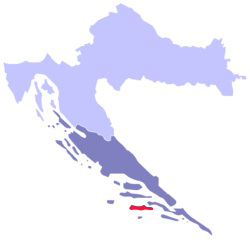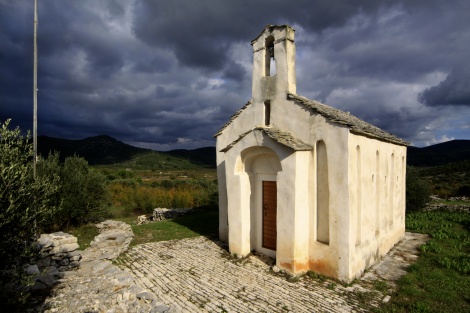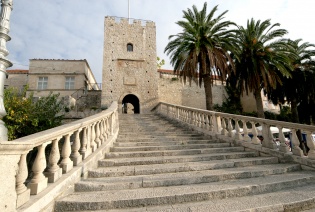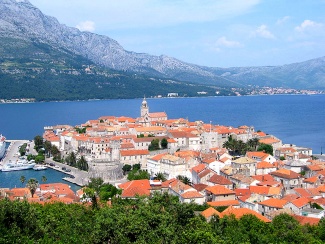Korcula Dialect

Korcula dialect (or Korčulanski) [1] is a Croatian dialect from the island of Korčula.The island of Korčula lies just off the Dalmatian coast in Croatia.[2] The language base of the Korčula dialect is Chakavian Croatian (it is also intermixed with Shokavian). The dialect has remnants of the extinct Romance language, Dalmatian The Dalmatian remnants within the dialect have been sometimes referred to as Corzulot.
Additionally it has influences of Venetian. The local dialect is sometimes referred to as Naski or more correctly Naški.[3] The š is pronounced sh. Sir John Gardner Wilkinson, [4] a 19 century English historian, referred to the Dalmatian Slavic dialect as Illirskee.[5]
Examples
Examples of Corzulot words compared with Vegliot, English and Croatian:
(Corzulot [6]/Vegliot/English/Croatian)
- buža/ bus/ hole/ rupa
- čimitir/ čimitier/ graveyard/ groblje
- dent/ diant/ teeth/ zubi
- faculet/ fazuol/ handkerchief/ rubac
- fatiga/ fatica/ working /radi
- fermaj/ fermai/ stop!/ stoj!
- jJeloz/ golaus/ jealous/ ljubomoran
- kantat/ cantar/ to sing/ pjevati
Encyclopedia Britannica on Vegliot: [7]
| “ | Romance language formerly spoken along the Dalmatian coast from the island of Veglia (modern Krk) to Ragusa (modern Dubrovnik). Ragusan Dalmatian probably disappeared in the 17th century. The Vegliot Dalmatian dialect became extinct in the 19th century. | ” |
Additional words from the Korcula dialect
(Korčula dialect/English/Croatian)
Template:Col-break- adio /goodbye/ doviđenja
- afitat/rent (Venetian:afìt)
- aimemeni/ poor me
- alavia /done properly or it's Ok! /u redu
- arbol/ ship's mast (In Venetian it means tree)
- aria/ air/ zdrak (Venetian: aria)
- arma/ armed (Venetian: arma)
- avižat [8]/ to arrive
- baleta/ bullet/ metak (Venetian:bal)
- banda/ side/ strana (In Venetian it means side & flank)
- balun/ football (Venetian:balón)
- banak/ bench (Venetian:banca) [9]
- baraka/ shed or shack (Venetian:baràca)
- barba/ uncle/ stric (Venetian:barba)
- barilo/ barrel (Venetian:barìla)
- barka/ type of local boat (Venetian:bàrca)
- bat / a type of hammer (Venetian:batu meaning to strike)
- bevanda/ wine with water/vino sa vodom (Venetian:bevànda "watery wine")
- beštija/ animal/životinja (Latin:bestia also beast)
- beštimat/ swear (Venetian:bestiemàr)
- bičve/ socks/ čarape
- bićerin/ small glass (Venetian:bicér "glass")
- Brigela/ local nickname (Venetian: brighela joker)
- bobon/ lolly
- boca/ bottle/ flaša (Venetian:boca)
- bonaca/ the sea is dead calm (Venetian:bonàça)
- botilja/ bottle (Romance Dalmatian:botaila) [10]
- botun/ button (Romance Dalmatian:botaun)
- bravo/ well done
- buka/ noisy (Romance Dalmatian:mouth)
- bukva/ herring
- bura/ local wind
- butiga/ shop
- buža/ hole/ rupa (Venetian: bus or buxa)
- cilo/ wine without water/vino bez vode
- cukar/ sugar/ šečer (Venetian: sucaro)
- čakule/ gossip
- čagalj/ jackal
- čorav/ blind (Venetian:ciòro "blind person")
- damižana /a netted bottle
- daž/ rain/ kiša
- Dreto/ straight (Romance Dalmatian: drat)
- Defora in old Venetian means "from the outside".
- Di greš?/ Where are you going?
- faca/ face/ lice (Venetian: faca)
- fabrika/ factory/ tvornica (Latin: fabrica- manufacture or to craft, trade, art, trick, device)
- fabrikat/ to trick
- falso/ fake (Venetian: falso "liar")
- feral/ a gas or petroleum lamp for attracting fish (night fishing). Also in Venetian feral means "lamp".
- fermai/ stop/ stani
- feta/ slice (Venetian: feta)
- figura/ figure (Venetian: figura)
- forma/ shape (Venetian: forma)
- fraja/ to go out and have a good time (Venetian: fraja-happy company or happy bunch)
- frigati/ to fry (Romance Dalmatian: fregur)
- forca/ power (apply with strength)
- fortuna/ strong wind
- fratar/ priest (Latin: frater meaning brother)
- fuga/ gap (Latin: flight, escape)
- fumar/ chimney (Venetian: fuma-smoke)
- fumati/ smoking/pušiti
- gira/ A fish from Croatia.
- griža/ hard stone
- gundula/ type of boat
- gusti/ enjoyment (Venetian: gusto-pleasurable)
- gusto/ thick
- gustrina/ rainwater reservoir
- guzica/ bottom
- hoča/ lets go
- kadena/ chain (Romance Dalmatian:kataina)
- kajić/ type of local boat
- Kalafats, means masters (shipyard workers) who filled the fissures between boards on a wooden boat.
- kamara/ bedroom/ soba (Latin:camera-vault, vaulted room)
- kantat/ to sing/ pjevati (Latin:canto)
- kapula/ onion/ luk (Romance Dalmatian:kapula)
- karoca/ small carriage (Venetian: carosa)
- katrida/ chair/stolica (Romance Dalmatian: katraida)
- katun/ corner
- klapa/ an a cappella form of music [11] (Venetian:clapa "singing crowd")
- koltrine/ curtains
- kontra /against/protiv (Latin:contra)
- korač/ hammer
- kormilo/ rudder
- kužin/cousin/rođak (Venetian:cuxìn)
- lacun/ bed-sheets
- lapis/ pencil/ olovka (Venetian: apis)
- lavadin/ washbasin (Venetian: lavandin)
- lešada/ a type of fish soup (boiled)/ Lesada in Venetian means boil.
- leut/ type of local boat
- levant/ local wind
- libro/ book/ knjiga
- licenca/ licence/ dozvola (Venetian: icenca)
- maistral /local wind
- makina/ machine
- Malandrin/ Local nickname. In Venetian it means: dishonest & crook
- mama/ mother/majka
- Maragun/ wood worker (Venetian:Marangòn)
- mapa/map (Venetian: mapa)
- mezo/in between (Venetian:mèzo "half")
- mlinko/ milk
- motika/ local agricultural tool
- mudante/underwear (Venetian: mudande)
- noštromo/ boatswain
- pamidora/ tomato (Italian pamidore)
- pandur/ policemen/ policija (Venetian: panduro)
- papit/ this word is used when feeding a child/ jedi djete/ (Venetian: papa-means baby food)
- perun/ fork (Venetian: pirón from Greek: pirouni)
- piat/ plate
- pikolo/ small, little (Venetian: picolo)
- pirula/ pill/ tableta (Venetian: pirola)
- pistun/ piston (Venetian: piston)
- pitura/ paint (Venetian: pitura-painting)
- Poć na ribe./ going fishing/ ići na ribanje
- postoli/ shoes/ cipele
- postelja/ bed
- punistra/ window (Latin:fenestra)
- rič/word
- ritko/ not often
- setemana/ week/ tijedan (Venetian: setemana)
- spim/I'm sleeping
- skula/ school/ škola
- soldi / money /novac (Latin:solidus)
- soto/ underneath/ ispod (Venetian:sot or soto)
- šestan/ attractive or good looking (Venetian:sesto-grace, well mannered)
- šija/ reverse/ natrag
- šiloko/ local wind (Venetian: siròco)
- škoj/ island/ otok
- škver/ shipyard/ brodgradilište
- špirit/ spirit
- šporko/ dirty (Venetian:spórco)
- štrada/ street/ ulica
- šufit/ attic or loft (Venetian:sofìta)
- šugaman/ beach towel
- tata/ father/ otac
- torta/ a type of cake (Venetian:torta-cake)
- tavajola/ tablecloth (Venetian:toaja)
- terpeza/ table/ stol
- ura/ hour/ jedan sat
- vapor/ ferry/ trajekt (Venetian: Bapor meaning steamship)
- vara vamo/ move on
- vedro/ clear sky (originally from Romance Dalmatian, vedar - to see)
- Vi ga niste vidili./You did not see him.
- zeje/ local dish
- zrcalo/ mirror/ ogledalo
Each town and village on the island have their own unique version of the dialect.[12] The Korčula dialect is found in the local folk music. The local Klape groups (an a cappella form of music) sing using the Korčula dialect. The well know Croatian singer, Oliver Dragojevic, has used the dialect in his music.
Korčula's old name was Curzola. The island was from 1420 to 1797 part of the Republic of Venice. The Old-Slavic term was Krkar. According to Nikola Ostojic the Greeks named it "Black Corfu" (Corcira Melaena) after their homeland and the dense woods on the island.

See also
References
- ^ The č is pronounced ch.
- ^ John Everett-Healu. "Dalmatia." Concise Dictionary of World Place-Names. Oxford University Press. 2005. Encyclopedia.com
- ^ Note: Naški means "ours" thus meaning "our language" in Croatian.
- ^ Dalmatia and Montenegro: With a Journey to Mostar in Herzegovina by Sir John Gardner Wilkinson. (p33)
- Sir John Gardner Wilkinson (October 5, 1797 – October 29, 1875) was an English traveller, writer and pioneer Egyptologist of the 19th century. He is often referred to as "the Father of British Egyptology".
- ^ Illyricum was a Roman province named after one of the Indigenous groups in the region.
- ^ Wikipedia: Dalmatian language
- ^ Encyclopedia Britannica: History & Society-Vegliot Dalmatian
- ^ The ž is is pronounced zh.
- ^ Venetian-English English-Venetian: When in Venice Do as the Venetians by Lodovico Pizzati (p19)
- ^ Dalmatian Language-Dictionary
- ^ The traditional Klapa was composed of up to a dozen male singers (in recent times there are female Klape groups). Klapa singing dates back centuries. The arrival of the Croatians to Dalmatia and their subsequent settlement in the area, began the process of the cultural mixing of Slavic culture with that of the traditions of the Roman-Latin population of Dalmatia. This process was most evident in the coastal and island regions of Dalmatia. In the 19th century a standard form of Klapa singing emerged. Church music heavily influences the arrangements of this music giving it the musical form that exists today.
- ^ Wikipedia: Korcula, Vela Luka and Blato and the coastal villages of Lumbarda and Racisce and in the interior Zrnovo, Pupnat, Smokvica and Cara.
External Links
- Photo link for a aerial view of Korcula Town
- Korcula Info
- Vela Luka-Mediterano
- Oliver Dragojevic-Official Web Site


<sharethis />
Korcula Korčula Korčulanski Corzulot Croatian dialect Dalmatian Venetian Klapa Korcula town Vela Luka Blato Lumbarda Racisce Zrnovo Pupnat Smokvica Cara Croatia Dalmatia Korcula Korčula Dalmatia Korčulanski Korčula Dialect Dalmatian Language
